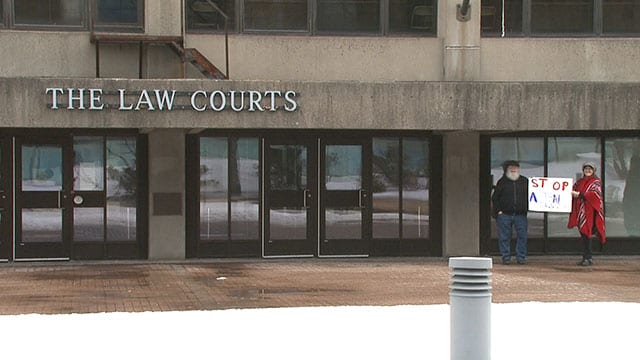
A former lawyer for the Nova Scotia Department of Justice who presented a brief suggesting the Mi’kmaq were a “conquered people” and is suing the premier for defamation had his efforts to release court records temporarily blocked Wednesday by the Supreme Court of Canada.
Alex Cameron has said in his defamation action that Stephen McNeil and a former justice minister libelled him when they implied he acted without instruction when he presented the brief.
Cameron wants exchanges he had with the government to be made public and to be admissible in court, while the province is arguing those documents shouldn’t be admitted due to solicitor-client privilege.
The province lost its blocking argument when the Nova Scotia Court of Appeal ruled in May the documents can be unsealed, but it is asking the Supreme Court of Canada to overturn that decision.
A judge from the high court issued a temporary stay on Wednesday to allow arguments to be submitted on whether the documents can be released.
Cameron’s lawyer, Bruce Outhouse, says that after written legal arguments are submitted, it’s likely the issue of whether the court records are opened will be decided within weeks.
The lawyer says it’s at that point that the public might finally see what his client was told.
Cameron was removed as government counsel in an Aboriginal rights case in December 2016 after suggesting in a legal brief the Mi’kmaq were a conquered people who were owed no duty of consultation.
The brief was part of the government’s defence when the Sipekne’katik band sought to overturn provincial approval of a plan by Alton Gas to store natural gas in salt caverns near the Shubenacadie River.
After Cameron presented the conquered people brief, there was a public outcry from the Mi’kmaq and others, and the province withdrew the document and disowned the argument.
Cameron, who had a career spanning close to three decades with the province, retired on April 30, 2017 and served legal notice on the government two days later.
In his affidavit, Cameron said the premier and then-justice minister Diana Whalen suggested he acted without instructions, or even contrary to instructions, in making the conquered peoples argument.
He said the arguments “were in accordance with” the instructions he was given.
Thus far, the former prosecutor has been successful in his efforts to have solicitor-client privilege waived in his lawsuit, but the province has continued to appeal.
In the most recent decision, the Nova Scotia Court of Appeal said it would be “manifestly unfair” to allow the province to hide behind solicitor-client privilege while at the same time impugning the conduct of its solicitor.
Premier McNeil has said his position has never changed regarding what happened.
“At no time did I have any indication that was the argument,” he said. “It’s my understanding no one instructed him to do that.”
news.ca











